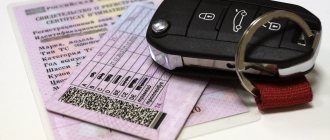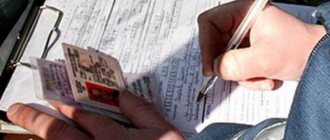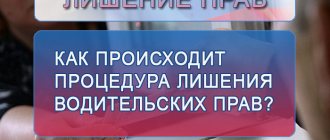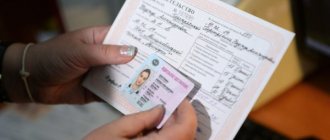Every year, sanctions for traffic violations are becoming more and more stringent due to the fact that previous enforcement measures are becoming less effective and ordinary monetary fines no longer scare anyone. Among the tightening rules, it is worth noting the deprivation of a driver’s license, which allows not only to punish the violator, but also to protect society from further negative actions of the offender, prevent the occurrence of dangerous situations on the roads, and show other road users that violating is not only unprofitable, but sometimes dangerous for life.
Driver's License Revocation Law
There is no single law in Russian legislation on the deprivation of a driver’s license. This issue is regulated by various legislative norms.
Attention! If you have any questions, you can chat for free with a lawyer at the bottom of the screen or call Moscow; Saint Petersburg; Free call for all of Russia.
- The main regulatory provisions that describe the reasons for deprivation of the right to drive vehicles are presented in Chapter 12 of the Code of Administrative Offenses of the Russian Federation. This part contains only those administrative offenses that relate to traffic rules and the operation of transport.
- Temporary restrictions on the use of rights are contained in the Law “On Enforcement Proceedings”, or more precisely in Article 67.1. It provides for “deprivation of a driver’s license” carried out by bailiffs for late payment of alimony and similar payments.
- Another legislative act that is applied in this matter is the Criminal Code of the Russian Federation. 264.1. Article of this regulatory provision states that persons who drive a mechanical vehicle for the second time while intoxicated, or allow another person in a similar state to get behind the wheel, are subject to criminal penalties.
- Controversial issues related to the deprivation of a motorist's rights, which arise in the courts when applying the part of the Administrative Code of the Russian Federation on traffic violations, are also resolved using the rules of law contained in the Resolutions of the Supreme Court of the Russian Federation.
Why can a driver's license be taken away?
The most well-known situation for which anyone can lose their driver's license is driving while intoxicated. According to statistics, this type of rule violation occurs most often.
Drinking alcoholic beverages and using intoxicants can lead to serious consequences, which may include:
- Driving your own car or other transport while intoxicated. In this case, the measured alcohol level in exhaled air should not be higher than 0.16 ppm, and its content in the blood should not be more than 0.35. This offense is considered grounds for deprivation of a driver’s license for a period of 18 to 24 months, in accordance with Part 1, Article 12.8 of the Code of Administrative Offenses of the Russian Federation.
- Transferring your vehicle to a person who is intoxicated. In this case, the punishment is similar to that provided for the act described in the previous paragraph, deprivation of a motorist’s rights, and ranges from 18 to 24 months in accordance with Part 2 of Art. 12.8. Code of Administrative Offenses of the Russian Federation.
However, you can also lose your right to drive a car for some other types of traffic violations and vehicle operation.
Table - Types of offenses that are grounds for deprivation of a driver’s license
| Article of the Administrative Code | Description of the offense | Period of deprivation |
| Part 2, 12.2. | Driving a car or other vehicle that does not have registration plates, or if they are incorrectly used, or if they are not readable | 1 – 3 months |
| Part 3, 12.2. | Driving a vehicle that has false registration plates | 6 – 12 months |
| Part 3, 12.5. | The use on cars or other vehicles of lighting devices whose lights are red, or retroreflective devices of red color, as well as such light devices that do not comply with legal requirements | 6 – 12 months |
| Part 4, 12.5. | Equipping a vehicle with light or sound devices without special permission | 12 – 18 months |
| Part 5, 12.5. | The use of light or sound devices, without permission, while driving | 18 – 24 months |
| Part 6, 12.5. | Application of color schemes used on operational modes of transport | 12 – 18 months |
| Part 4, 12.9. | Increasing the speed limit above the permissible limit by 60 - 80 km/h | 4 – 6 months |
| Part 5, 12.9. | Increasing the speed limit above the permissible limit by 80 km/h | 6 months |
| Part 7, 12.9. | Secondary speeding | 12 months |
| Part 1, 12.10 | Crossing railway tracks, moving outside a railway crossing, if the barrier is closed, a prohibitory traffic light or duty signal has been given, including stopping/parking at a railway crossing | 3 – 6 months |
| Part 3, 12.10 | Secondary commission of the violations described in the previous paragraph | 12 months |
| Part 3, 12.12 | Driving through a red traffic light/forbidden gesture by a traffic controller for the second time | 4 – 6 months |
| Part 4, 12.15 | Driving into the oncoming lane or onto tram tracks in the opposite direction in violation of traffic rules | 4 – 6 months |
| Part 5, 12.12 | Repeated commission of the violation described in the previous paragraph | 12 months |
| Part 3, 12.16 | Driving in the opposite direction on a one-way road | 4 – 6 months |
| Part 3.1, 12.16 | Repeated commission of the violation described in the previous paragraph | 12 months |
| Part 2, 12.17 | Failure to provide movement to vehicles that have external special color schemes, inscriptions, designations, and which simultaneously have blue flashing lights turned on, and also have a special sound signal | 1 – 3 months |
| Part 3, 12.21.1 | Driving heavy vehicles, as well as vehicles with large dimensions that are 20 - 50 cm higher than the permissible norm, or whose weight, as well as the axle load, falls within the range of 20 - 50% without special permission | 2 – 4 months |
| Part 5, 12.21.1 | Driving heavy vehicles, as well as vehicles with large dimensions that are 20 - 50 cm above the permissible norm, or whose weight, as well as the axle load, falls within the range of 20 - 50%, with special permission. | 2 – 3 months |
| Part 6, 12.21.1 | Driving heavy vehicles, as well as vehicles with large dimensions that are more than 50 cm above the permissible norm, or whose mass, as well as the axle load, is more than 50%, with or without a special permit | 4 – 6 months |
| part 1.12.21 | Transportation of dangerous goods by a person who does not have a certificate of their preparation, access to them, special permission, emergency card, etc. | 4 – 6 months |
| part 1.12.24 | Offenses that resulted in minor harm to the victim’s health | 12 – 18 months |
| part 2.12.24 | Offenses that resulted in the infliction of moderate harm to the health of the victim | 18 – 24 months |
| part 1.12.26 | Disagreement to undergo a medical examination for intoxication | 18 – 24 months |
| part 2.12.27 | Unauthorized leaving the scene of an accident | 12 – 18 months |
| part 3.12.27 | Consumption of alcohol-containing products, or drugs or psychotropic substances after an accident or before the examination was carried out, or after the decision was made that the examination was not necessary | 18 – 24 months |
Here is a considerable list, for failure to comply with which the driver of the vehicle may be subject to deprivation of his license.
In the above list of violations, deprivation of rights is an extreme measure of punishment; instead, another, but corresponding to the act, can be chosen.
Temporary deprivation of rights can be carried out by bailiffs in accordance with Article 67.1 of the Law “On Enforcement Proceedings”. According to this regulatory provision, a driver may lose his license on the following grounds:
- late payment of alimony;
- non-compensation for harm caused to health or in connection with the death of the breadwinner;
- failure to compensate for property damage or moral harm caused by the crime;
- failure to comply with non-property requirements related to raising children;
- failure to comply with traffic police fines.
If any of the above points are not met, the bailiff may impose a restriction on driving.
However, from this list it is worth immediately excluding those who will not be affected by this punishment in any case. Thus, the right to control will not be limited if:
- the driver has the opportunity to receive income only from the car, for example, a taxi driver;
- the area in which the debtor lives and his family is in a hard-to-reach place, and deprivation of rights will not allow for a basic standard of living;
- a driver who has been identified as disabled;
- a driver who is in his care a disabled person of group 1 or 2, or a disabled child;
- a driver who has been granted a deferment or installment plan for the debt under a writ of execution.
Why can a driver's license be taken away and the right to drive a car deprived of it?
Many drivers are interested in the question: why can a traffic inspector take away a driver’s license? It is important to know that a document giving the right to drive a vehicle (hereinafter referred to as a vehicle) cannot be seized by a traffic police officer without good reason. Taking away a driver's license (hereinafter referred to as a driver's license) is permitted only if a citizen, while driving a vehicle, has committed a serious administrative offense for which he may be deprived of the right to drive a car.
Why can your driver's license be revoked?
Every driver needs to know that it is possible to deprive a driver’s license if he commits the following administrative offenses:
- Driving a vehicle that does not have registration plates;
- The presence of flashing lights and sirens in the car;
- Violation of the rules for crossing railway crossings;
- Driving while drunk;
- Exceeding the maximum speed limit on a section of the road by more than 60 km/h;
- Violation of the rules and regulations that are provided for the transportation of large/dangerous goods;
- Driving into the oncoming lane on sections of the road where this is prohibited by traffic regulations;
- Failure to comply with the traffic inspector’s requirement to undergo a medical examination;
- Violations of traffic rules that resulted in certain harm to the health of the injured party.
In addition, the driver faces such punishment as deprivation of his license in the event that he unauthorizedly left the scene of an accident.
Execution of the decision to confiscate a driver's license
Based on the legislation, from September 1, 2013, when a violation of traffic rules is committed, which entails the deprivation of the right to drive a vehicle, the driver’s license is not confiscated, but a protocol on the administrative offense is drawn up and the case is transferred to the court of the appropriate instance. Thus, the driving document remains in the hands of its owner until the day the court decision enters into legal force.
According to the law (Articles 31.1 and 31.2 of the Administrative Code), a person is brought to administrative responsibility from the day when the resolution on this comes into force. It is subject to mandatory execution from this moment.
Calculation of the period of deprivation of a driver's license
In accordance with the Code of Administrative Offenses (Part 1 of Article 32.7 of the Code of Administrative Offenses), the countdown of the period for which the driver is deprived of the right to drive a vehicle begins its calculation from the moment the court ruling comes into force.
This means that during the period of time between the issuance of such a decision and the date of its entry into force (usually from 10 days to several months), the driver has not yet been brought to justice and continues to use a driver’s license. It should be noted that this applies to cases where the driver decides to appeal the court decision and begins this process.
There are situations when people have already been deprived of the right to drive a vehicle in court and have not appealed the court decision, but are evading the mandatory submission of a driver’s document.
In this regard, there is a separate article of the Code of Administrative Offenses (Part 2 of Article 32.7), according to which the period of deprivation is calculated in cases where the perpetrators evade submitting documents (if the resolution has entered into legal force).
In such conditions, the period of deprivation of the special right is interrupted, and its calculation begins again only from the moment the driver actually surrenders the license.
In conclusion, it should be noted that, according to the current norms of the Code of Administrative Offences, only a judge, by his decision, can deprive the right to drive a vehicle and the question “why can the license be taken away” automatically disappears. At the same time, it is not advisable to evade the voluntary surrender of rights, since the punishment will still overtake the culprit.
It will be useful for both novice and experienced drivers to know for which violations they can be deprived of their driver's license.
To do this, below we provide a complete list of those traffic violations, the punishment for which will be deprivation of a driving license.
Studying this list is guaranteed to allow car drivers to correctly navigate the nuances of the Code of Administrative Offenses and Traffic Regulations, minimizing the likelihood of being left without a license for a long period.
Still have questions?
Call the number (MSK and MO), +7 (812) 426-14-93 (SPb and LO) and ext. 181 (general) and our auto lawyer will answer all your questions for FREE.
: 01-10-2017
Source: https://AvtoUdostoverenie.ru/lishenie/za-chto-mogut-zabrat-prava.html
Procedure for deprivation of a driver's license
Deprivation of a driver's license provides for a certain procedure:
- The traffic police inspector draws up a protocol in which he records the fact of the offense, enters the necessary information and testimony of the offender in the presence of two witnesses.
If a driver is deprived of the right to drive for driving while intoxicated, the first point should include passing a medical examination. This is one of the most important evidence of the guilt of the offending driver.
- The inspector then confiscates the driver's license and issues a driving permit in place of the driver's license, which is temporary. It is valid until the decision to withdraw rights is made by the court.
- Next, the rights are transferred to a special body of the State Traffic Safety Inspectorate, where a decision is made on the return of the rights and the imposition of an alternative punishment, or that the rights really need to be withdrawn. Rights must be transferred to the specified authority within 3 days. In this case, the official must make a decision within 15 days.
- If the State Traffic Inspectorate made a decision to confiscate the driver’s license, then the case goes to the magistrate or district court and is considered there.
- The court makes a final decision, which may indicate either that the rights really need to be taken away, or provide for another type of administrative punishment.
- If the court decides that the driver should be deprived of his driver’s license, then within a specified period of time he must also submit a temporary permit.
- The driver has the right to disagree with the court’s opinion and, within ten days, to send an appeal to a higher court and thus appeal the initial decision.
When depriving a motorist of his rights for non-payment of alimony and other payments described in Art. 67.1. of the Law “On Enforcement Proceedings” the procedure is slightly different. It goes through the following stages:
- The court makes a decision to collect alimony/other payments.
- A writ of execution regarding this decision is issued to the plaintiff or sent to the bailiff service.
- After the bailiff service receives the writ of execution and the claimant’s application, they initiate proceedings in the case within three days.
- Then the bailiff sends a copy of the decision to initiate enforcement proceedings to the defendant.
- The defendant has the right to voluntarily comply with the payment requirement within 5 days.
- Then the bailiff issues a resolution on a temporary restriction on the debtor’s use of a special right, that is, the right to drive a vehicle.
- This decree is signed by the senior bailiff, a copy of the decree is issued to the debtor the next day, and another copy is sent to the traffic police.
- After this decision, the debtor does not have the right to drive a vehicle, although his license is not confiscated.
A temporary restriction on a driver's license can be made only if the amount of debt is more than 10,000 rubles. In addition, after repayment of the debt, restrictions on the driver's license must be lifted.
Bureaucratic stages of depriving a driver of the right to drive a car
The procedure for deprivation of a driver's license is complex. And, before it comes to the seizure of rights, you will have to go through several stages. Doing the right thing on each test can help you keep your driver's license.
Stage 1. Drawing up a protocol on an administrative offense by the traffic police inspector
As mentioned above, in most cases, at the scene of an offense, the traffic police inspector is not the one who can deprive the driver of his license. He only has the right to draw up a protocol in which he is obliged to reflect:
- Your details (position, rank, department, full name).
- Driver details (full name, registration and residence address, place of work and position, driver's license number, Russian language proficiency).
- Information about the vehicle in which the violation was committed.
- Date, time and place of the offense.
- The point of the rules and the essence of the offense.
- Article of the Code of Administrative Offenses of the Russian Federation, under which deprivation is assumed.
- Information from witnesses and victims (if any).
- Availability of additional materials on the case (photo or video).
- Place and time of consideration of the case of administrative violation.
- Driver's explanations.
- Petition for consideration of the case at the place of residence of the culprit (if desired).
- The driver’s signature confirming his agreement (disagreement) with the drawn up protocol and receipt of its copy.
Behavior when drawing up a protocol
No matter how worried you may be about such an unpleasant meeting with a State Traffic Inspectorate employee, when stopping and drawing up documents, control yourself. Panic is not the best way out of this situation. But constructive and calm behavior can greatly ease your fate. I'll give you some advice:
- Be calm. You should not raise your voice at the traffic police inspector and try to prove your innocence in a dispute, this can only worsen your situation.
- Try to find a compromise. With balanced behavior, agreement with your offense and a sworn promise not to break again, perhaps the inspector will limit himself to a fine (if the violation provides for such a possibility).
- Don't say you violated it intentionally. Agreeing with the fact that they were not driving according to the rules does not mean the need to talk about deliberately ignoring the rules of the road. That is, yes, he violated, but he is guilty. But I didn’t see the sign, the markings were covered with snow, I drove around the obstacle, and you never know what else you can come up with in a specific situation.
- Read the protocol carefully. We'll talk about this in more detail later.
What to pay attention to before signing the protocol
The protocol drawn up by the traffic police inspector is a key document in administrative proceedings against you. Take the trouble to study it carefully before putting your signature on it. Since rights are deprived only in court, all marks and inaccuracies are very important for further defense and appeal of the decision (if necessary). What you should pay special attention to:
- Description details. Make sure that the inspector outlines all the details of the incident, even if they seem insignificant. In court, when defending yourself or under the tutelage of a lawyer, everything can be useful.
- Your complaints. Reflect in the protocol everything that did not suit you or confused you in the actions of the State Traffic Inspectorate employee.
- Dashes. To prevent unscrupulous law enforcement officers from having the opportunity to add to the protocol at their own discretion after signing it, make sure that there are dashes in all blank fields of the document.
- The presence of a line explaining your rights and responsibilities. In this case, its absence will be beneficial. Then you will have a great chance of challenging the validity of the document drawn up in court.
- A note about the presence of photos or videos, witnesses. If there are any, check that the traffic police inspector did not forget to indicate them.
- Valid equipment certificates. If any devices were used to record the violation, request a certificate for them. If they are absent, be sure to note this fact in the protocol.
- Petition to transfer the place of consideration of the case. Usually the case is heard where the offense was committed. If you are not comfortable with this, you can apply for a review at your place of residence.
- Your signature. Remember that you are not required to agree with everything and sign the document drawn up by the inspector. If you disagree with anything in the protocol, write that you disagree and list what exactly you disagree with.
Advice! If you are in doubt about what to do correctly or have forgotten everything you need to do out of fear, it may make sense to consult with a car lawyer by phone.
Stage 2. Meeting of the commission at the State Traffic Inspectorate
After drawing up the protocol, the authorized person submits it to the State Traffic Inspectorate. Here they already make a decision to impose a fine on the violator (if a specific article provides for such a possibility) or to transfer the case to court to deprive the driver of the opportunity to drive a car.
Stage 3. Court hearing and decision
This is a key stage. Since the driver is deprived of the right to drive in court. Such cases are heard by magistrates. If a petition has not been filed, when drawing up a protocol, the hearing takes place in the court that is closest to the place where the offense was committed.
Note! You must be notified in advance of the time and place of the court hearing. This may be a subpoena, registered letter, telephone message and other methods. The main thing is that the fact of delivery of the notice to you personally must be recorded.
If the driver was notified in accordance with the rules and did not appear in court, then the decision may be made without him. As you understand, this is not good for you. After all, there will be no opportunity to express your point of view, to justify yourself. Accordingly, it will not be possible to avoid deprivation of the driver’s license and win the case. Of course, if there was a good reason for failure to appear, which is confirmed by documents, then the court hearing may be postponed. And even several times! It may even be possible to evade liability due to the statute of limitations. But these are rare cases. At the end of the process, the judge makes a decision to dismiss the case against you or a deprivation order, indicating the period for the withdrawal of the driver's license.
Note! After the decision is made, you will have 10 days to appeal the decision. This is an optional procedure. But, if you categorically disagree with the results of the meeting, then you can appeal to higher courts, right up to the last.
Article on the topic:
Find out everything about the driver's license revocation trial to prepare and win it: where, when and how the process takes place, who is involved in it
Stage 4. Transfer of the driver's license to the traffic police department
If you have not appealed the court decision, then after 10 days it comes into force (Part 1, Article 31.1 of the Code of Administrative Offenses of the Russian Federation).
Attention! Until the regulation comes into force, you can continue to drive your car.
According to Part 1 of Article 32.6 of the Code of Administrative Offenses of the Russian Federation, deprivation of the right to drive a car is carried out in the form of its confiscation from the driver. Part 1. 1. Article 32. 7. The Code of Administrative Offenses of the Russian Federation obliges you to hand over your license to the traffic police department within three working days after the decision enters into legal force. The same article (parts 2 and 3) provides for the option that the violator will not surrender his ID. In this case, the calculation of the period of deprivation is interrupted. And it will not begin until the rights are in the traffic police department or a statement about their loss is written.
That is, you won’t be able to rely on luck to ride for a whole year with a license, and then it will become valid again. If you are caught driving with such a license, it will be confiscated, and only then the sentence will begin to count. In addition, Article 12.7. of the Code of Administrative Offenses of the Russian Federation will be applied to you , since this is equivalent to driving without a license. Under this article you face:
- Removal from management;
- Imposition of a fine in the amount of 30 thousand rubles;
- Administrative arrest for up to 15 days;
- Mandatory work from 100 to 200 hours;
- Detaining and placing the car in a special parking lot.
It is also not a good idea to drive a car with a fake license. This will result in criminal liability.
When does the revocation of a driver's license take effect?
A court decision that a driver is subject to deprivation of his license comes into force 10 days after it is made. During this time you can drive on a temporary permit, but after this period you must stop driving. Even if your temporary permit to drive a vehicle does not expire, and it is issued for a period of two months, you still do not have the right to drive. Otherwise, you may be subject to administrative penalties.
To ensure that the period of deprivation of a driver’s license does not increase, it is better to hand over the temporary permit yourself.
If the driver decides to appeal the court’s decision, the effective date of the punishment will be delayed until the offender achieves what he wants and receives another punishment, or until he goes through all the courts and receives a final verdict.
At what point does the period of deprivation of driver's license begin?
After the court makes a decision to deprive the right to drive vehicles for a certain period, the offender has the right to appeal the decision within the first 10 days (Administrative Code, Article 30.3, paragraph 1). If the appeal does not occur, then the driver is obliged to submit the driving license to the traffic police department within 3 days (Administrative Code Article 32.7 part 1.1) and receive a certificate confirming this fact.
The period for calculating the penalty begins from the moment the driver’s license is presented to the traffic police officer for safekeeping. This point is regulated by the Code of Administrative Offenses and is clearly stated in Article 32.7 Part 1.
Petition not to revoke a driver's license
A petition is one way to help get your driver's license back. In some life situations, this document can help. The petition requests that the driver's license not be revoked, and also indicates a number of reasons that are significant. In this case, the document can be submitted:
- personally by the offender;
- his representative;
- a relative, friend, etc., if they have a direct interest;
- employer;
- a teacher from an educational institution, etc.
You can apply for non-deprivation of your driver’s license at any stage of the case:
- At the time of the preliminary investigation, the document must first be submitted to the State Traffic Inspectorate.
- If the case has already been transferred to a judicial institution, then the question of rights is already resolved by the judge and the document is submitted in his name.
- The document can also be submitted during the trial, where the judge will either add it to the case or issue a reasoned refusal.
- After the decision is made by the magistrate. In this case, an appeal is filed. At all subsequent stages there is also the possibility of filing a petition.
However, it should be understood that the petition is written and will find a response only when the violation was extremely minor and was committed only once. In other cases, such documents, as a rule, remain without movement, especially when deprivation of rights cannot be replaced with another, milder punishment.
When does the period of revocation of a driver's license end?
The period for revocation of a driver's license ends for each violating motorist in due time. In order to calculate on what day you can already take away your rights, it is worth knowing the day on which the legal court decision came into force and the period for which you were deprived of your rights. To find out on what day a legal court decision came into force, you can add another 10 days to the day of its issuance. By simple calculations you can find out when the period of deprivation ends.
Moreover, if the end of the period falls on a weekend or holiday, you will have to wait until the first working day. In a situation where the terms and date of deprivation are not known for some reason, you should contact the local State Traffic Inspectorate and resolve the issue there.
Repeated driver's license revocation
Deprivation of a driver's license is called repeated if it was committed within one calendar year with the previous punishment. In this case, the expiration time of its action is considered. You can lose your rights a second time in the following situations:
- When driving while intoxicated.
- If you allow a drunk driver to drive your car or other vehicle.
- When exceeding the speed limit by more than 60 km/h.
- In case of violation of traffic rules related to crossing a railway crossing.
- In case of driving into the oncoming lane.
- When driving in the oncoming lane in one-way traffic conditions.
In all other cases, you will receive the usual form of punishment.
In case of repeated deprivation for driving while intoxicated or for failure to undergo a medical examination, the punishment will be regulated by the provisions of Art. 264.1 of the Criminal Code.
So for this offense the following is provided:
- confiscation of driver's license for up to 3 years;
- imposition of a fine from 200,000 to 300,000 thousand rubles or in the amount of wages or other income for a period of 1 to 2 years;
- performing mandatory work for up to 480 hours;
- performing forced labor for a period of up to 2 years;
- imprisonment for a period of up to 2 years.
Deadlines for returning a selected motorist license
The time frame for returning a driver's license also depends on the type of offense. In most cases, the commission of an offense entails a ban on driving a vehicle for a period of one year, and in a situation with driving while intoxicated, for a period of up to 3 years.
If the deprivation of rights was made for violating various traffic rules, then the terms will be summed up in accordance with Part 3, Art. 32.7 Code of Administrative Offenses of the Russian Federation. For example, for driving without registration plates, a penalty is imposed in the form of deprivation of rights for 2 months, and then another 6 months for driving in the oncoming lane with one-way traffic (as a rule, the second act is committed within 10 days after the first, when the temporary permit is still in hand ). Thus, the driver will receive a license 8 months after the court decision comes into force.
How to find out when the period of revocation of a driver's license expires?
You can find out the expiration date of the deprivation of a driver’s license on the traffic police online service at: https://www.gibdd.ru/check/driver/#+. Or by contacting the local department of the State Traffic Inspectorate.
Step-by-step guide to returning your driver's license after deprivation
The return of your driver's license will take place in several stages. Obtaining a license takes place in the same department where it was originally submitted. The first stage will be passing the theory test, which all driving school students take. Registration for the theoretical exam is made at the MREO department of the State Traffic Safety Inspectorate of the Ministry of Internal Affairs of Russia in the corresponding city. You need to sign up for the exam in advance, providing the necessary papers (application for taking the exam, identity document) and wait for a message about the date and time of the exam. You can also sign up for the exam through the GOS services website. Then, you must pay all existing traffic fines.
IMPORTANT
For drivers who have lost their license because they were under the influence of alcoholic beverages, they must undergo a medical examination before returning the driving license and receive the appropriate certificates after its successful completion.
When you have completed all the above points, you should come to the traffic police department with the following documents: passport; a copy of the court decision on deprivation of the driver's license; medical certificate (only for drivers deprived of their license for driving while intoxicated from alcoholic beverages); a receipt for payment of existing traffic fines and a document that confirms the successful completion of a theoretical exam at the department of the State Road Safety Inspectorate.
After completion of the sanction, the motorist has the opportunity to return his driver's license within three years from the date the sentence expired. If after this time the driver has not restored the driver’s license, the license will be irretrievably destroyed (Part 5 of Article 32.6 of the Code of Administrative Offenses of the Russian Federation). It can only be restored by re-collecting all the necessary certificates, going through the necessary procedures and submitting an application to the traffic police department.
How to reduce the period of revocation of a driver's license?
The period of deprivation of a driver's license can be reduced only if the period of deprivation was more than the minimum. For example, if a prison term of 1.5 years is imposed for driving while intoxicated, then it will be impossible to reduce the period of imprisonment, since a minimum term has been assigned. Another situation is when the driver’s license was revoked for driving without registration plates and a period of deprivation of 2 months was assigned, then in this case it will be possible to try to reduce the period of deprivation of a driver’s license to one, since for this offense the minimum punishment is 1 month.
A driver who wants to reduce the time limits submits documents to the court. At the same time, they should characterize it only from the positive and better side. Such documents may be:
- Characteristics from the place of work.
- A petition clearly stating why it is necessary to reduce the period, for example, if transport is the only source of income in the family, etc.
Early receipt of a driver's license after deprivation
You can get your license ahead of schedule only if your term is reduced in court for good reasons, sufficient reasons and for a period to a minimum. In other situations, it is simply impossible to return rights at the post-trial stage in a legal way.
Deprivation of rights for up to three months
For different violations in 2021, different periods of deprivation of driving license are provided. The mildest punishment is deprivation of rights for a period of one to three months. This kind of deprivation is the most difficult to “earn”, since it is provided for very rare violations:
- driving without license plates or hiding license plates;
- refusal to give way to a car with special lights on;
- repeated driving of a vehicle that is not registered with the traffic police.
Previously, many car enthusiasts installed frames on their cars that covered or reversed the license plate. This was done in order to protect against all-seeing speed cameras or lane control cameras. When the road inspection revealed a sharp increase in the number of motorists hiding license plates, an initiative arose to introduce deprivation of rights for such a violation.
You can also “arrive” for a deprivation of one to three months without giving way to a car with blue or red-blue flashing lights. These are ambulances, intensive care vehicles or police vehicles. Less common in the capitals are official Mercedes with a “blue bucket”; they are also considered cars with a special signal.
Also read: Traffic controller signals in simple language
Retake after revocation of driver's license
After deprivation of a driver's license, you will need to retake a theoretical exam on the rules of the road. There can be as many attempts as you want to pass the exam; there are no restrictions on them. However, for each attempt you will have to pay a state fee of 4.5 thousand rubles, which is not very profitable, so it is advisable to pass the exam the first time. The exam is taken in the form of testing, which consists of 20 tasks. The time allotted for the test is 20 minutes. In this case, there can be no more than two errors. After successfully passing the test, the driver receives an examination card confirming the successful completion of tasks and with it can already obtain a license.
Features of deprivation of a driver's license
A special feature of deprivation of a driver's license is the procedure for their return. In order to get your rights back you will need:
- a decree on the deprivation of a driver’s license, despite the fact that the law does not provide for its presentation upon return, the traffic police usually ask for it;
- passport or identity document;
- in some cases a medical certificate; in practice, this is also usually required.
You should contact the traffic police department whose officer seized your license and drew up a report. As already mentioned, to obtain a driver's license you will need to pass a theoretical exam. Also, in addition to passing the theory, you will need to pay all outstanding fines. The driver's license is stored in the archives of the traffic police for three years, and then they are destroyed, in this way it is possible to lose the license, so it is better not to delay in returning it.
Punishments for violating traffic rules are becoming more stringent every year. You can now lose your right to drive for quite a long time, and also suffer heavy losses. In this regard, I would like to note that it is better not to violate traffic rules, but to drive strictly according to the rules, which will save not only time and money, but also the lives of innocent people who may suffer from wrong actions.
We return the rights after the expiration of the period of deprivation
Even if such a nuisance happened and you were left without the ability to drive a car for some period of time, sooner or later the period of punishment will end. In order to regain your rights after the expiration of the period of deprivation, you will have to do more than just show up at the traffic police department. You must pass a theoretical exam on traffic rules. And if you are punished for driving while intoxicated, you will also have to undergo a medical examination.
Article on the topic: How to quickly and correctly obtain a driver’s license after deprivation









